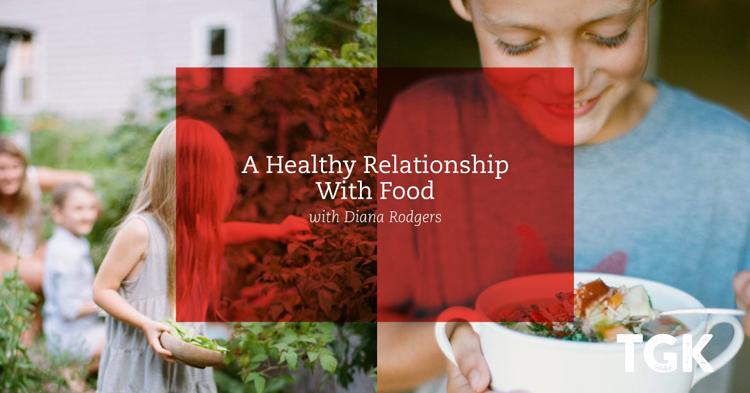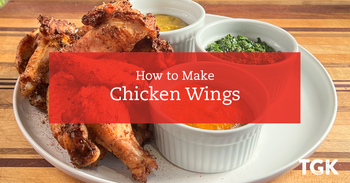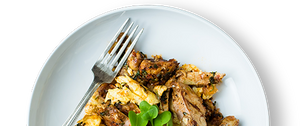10 Tips for Teaching Kids to Have a Healthy Food Relationship
Ten helpful tips on how to set your kids up for a lifelong healthy relationship between food and good health.
In looking to create a post around teaching kids the importance of nutrition, I stumbled upon the following blog post. Which happens to be written by our good friend, Diana Rodgers from Sustainable Dish. She has some hefty initials behind her name (RD, LDN, NTP) and is a "real food" Licensed Registered Dietitian Nutritionist and Nutritional Therapy Practitioner living on a working organic farm just west of Boston, Mass. Not to mention an author and director. So, why not let an expert speak...
by Diana Rodgers / Photos by Heidi Murphy
It’s a crazy food climate these days. We’re bombarded with processed food everywhere we turn, and it’s especially attractive to kids. But how do you talk to your kids about eating well without creating emotional issues around food? Here are some tips on how to set your kids up for a lifelong healthy relationship between food and good health.
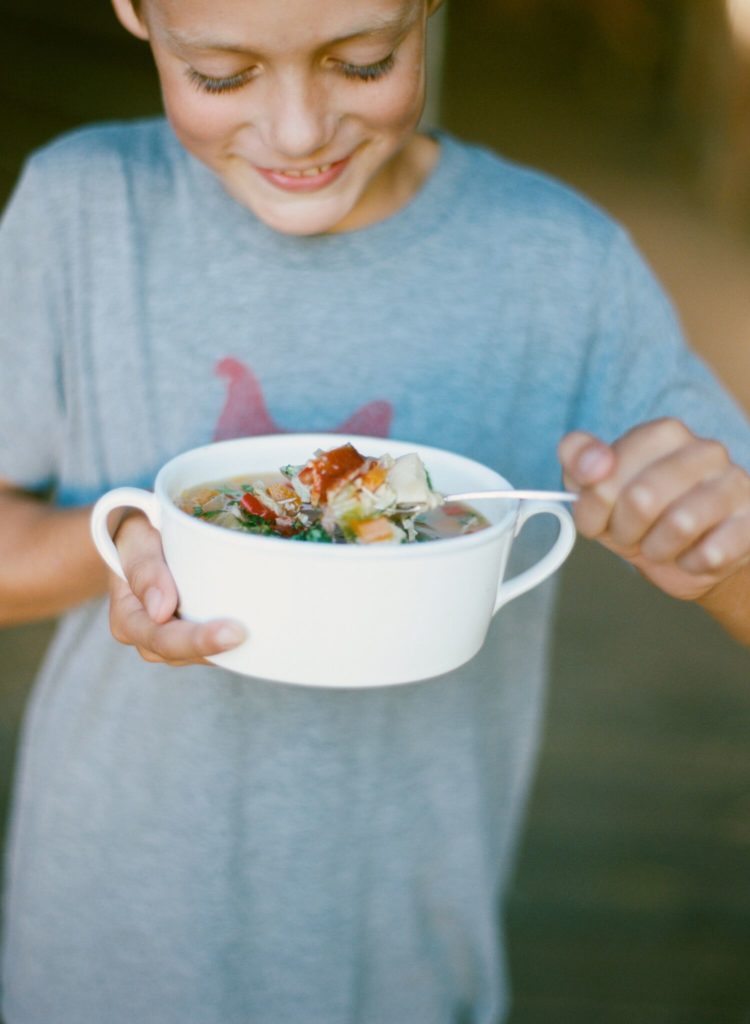
Anson with “Big Bad Rooster Soup”
-
Lead by example. Here’s an obvious one. Kids learn by watching what you do. If you’re not making great choices, then don’t expect your kids to, either. Here’s a great example: during my dietetic internship, my boss (the head RD) was always eating a plain salad (no protein, no fat, just lettuce and some limp cucumbers) and a diet coke. She constantly complained that she was hungry, tired, and couldn’t lose weight. My salads were loaded with protein and fat, and when she started to show interest, I then opened up and suggested she try adding some protein and fat to her salad. Two weeks later I she started a Whole30 and it blew her mind. The trick is, I never once “told her” what to do. I waited for her to ask. She showed interest because I wasn’t being “preachy.” The same goes for your kids. Just make great food, put it out there, and see what happens. My rule is always, “Just try it. If you don’t like what’s for dinner, you can have scrambled eggs.” It works!
-
Don’t let them snack constantly. I see this all the time, especially with the little guys on the playground. Kids do not need a constant dose of goldfish crackers all day long. It ends up being just enough to take the edge off their hunger, so they can more easily push away healthy choices later. If you want to avoid having picky eaters, make sure they are actually hungry when they sit down for a meal. Kids do need to eat more often than adults, so healthy snacks are totally ok, but they don’t need to graze all day long. If they do have a snack, make sure it’s got some protein and fat, like cheese or nuts along with a piece of fruit. My kids actually love coming home from school and heating up meatballs!
-
Stop Baking. I know this is probably a touchy one. Baking with mom is a very common way to bond with kids. However, think about what you’re making. It’s likely not the healthiest choice. It may be fun to measure out the ingredients, make a big mess in the kitchen and eat what you’ve made, but the results are usually a dozen or more sugary treats. I actually think that baking goodies with mom and tying in sweet treats with comfort is setting up some pretty bad lifelong associations between sugar and happiness. Instead, how about making a soup together? You can still measure out the ingredients, eat the results, and spend quality time together. Want a fun craft? Try making naturally colored eggs. The art teacher in me (my previous life) loves involving kids in creative projects that don’t end in a sugar rush.

Phoebe with apples.
- Always offer great options at home. Here’s another pretty obvious one, but if you want your kids to stop drinking juice and soda, don’t have it in the house. If the kids are looking for a snack on their own, better options are things like leftovers, eggs, fruit or epic bars. Now, I don’t “ban” foods from their lives. They are allowed to get an occasional treat when we’re out, but they know those foods aren’t going to help them grow strong, and they don’t make it into our home.
-
Don’t go to restaurants that have a kids menu. I really hate kids menus. They’re so insulting to our kids, and makes it seem like the only things kids will eat are chicken fingers or mac and cheese. My kids do like those things, but I know that they will make better choices if we go to a restaurant that just offers real food. Brazilian restaurants top my list. There are a few choices near us, and my kids love the rotisserie meats and salad bar. I also like taking them out for Vietnamese and Indian food. You might be surprised if you expose your kids to a wider variety of ethnic foods. These places tend not to offer standard American kids menus, and I think the food is much better than standard pub choices.
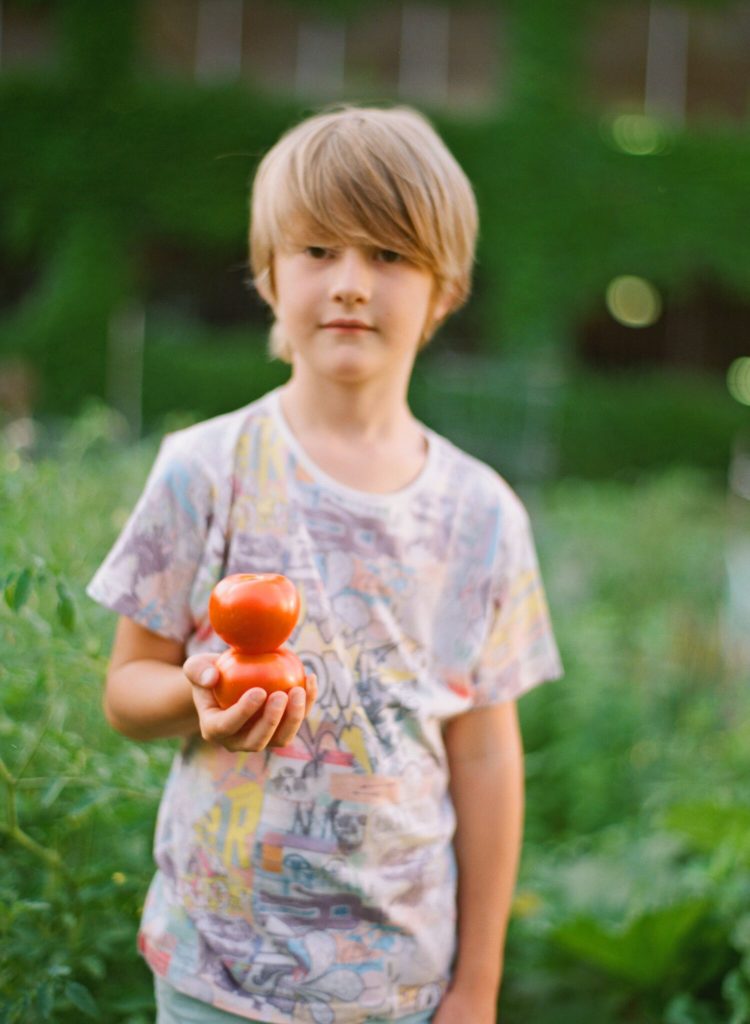
Hector with Tomatoes.
-
Talk about the health benefits. When you sit down to eat dinner together, try to highlight the health benefits of what you’re eating. Now that my kids are in middle school, we talk about the importance of proteins and how they’re the building blocks for growth. Parents of teens might want to focus on food’s role in skin health and energy levels for sports or mental focus. When my kids were little and always carried lightsabers, I would say that their eggs (or whatever healthy food was on their plate) had extra “midi-chlorians,” the microscopic life forms that reside in high numbers, inside all Jedi warriors.
- “Without the midi-chlorians, life could not exist, and we would have no knowledge of the Force. They continually speak to us, telling us the will of the Force. When you learn to quiet your mind, you’ll hear them speaking to you.” – ‚ÄïQui-Gon Jinn, to Anakin Skywalker
-
Talk about how food makes you feel. I have so many adult nutrition clients who don’t make the connection between their energy levels, moods, and gut symptoms to what they’re eating. These things are all related. When the kids come home from school or friend’s house drained or with a stomach ache, I always ask, “Well, what did you eat for lunch today?” I let them make their own food choices when they’re not at home, but I do always let them know that if they’re not feeling great, it’s likely due to what they ate. This way, they’re learning how to make better choices instead of thinking, “My mom wouldn’t let me eat that.”
-
Talk about the general food climate. Instead of singling out individual foods, talk overall about how our grocery stores and vending machines are filled with unnatural food choices that can be hard for people to resist. A great film to watch with middle school and high school kids is Fed Up, which highlights how much sugar is in the average kid’s day and how you can’t just “work off” a bad diet at the gym. It also does a great job at showing just how prevalent food-related health issues are among kids. Our farm hosted a screening of it and many people told me it really changed how they ate. The education director at the local church said it motivated her to stop offering cookies to kids for social hour.

Isabel Picking Veggies.
-
Involve them in shopping. My 11 yr old daughter knows our local Whole Foods like the back of her hand. She can zoom up and down the aisles and get pretty much everything on the list. She’s super fun to go shopping with. We taste cheeses together, look at the fish and decide which is freshest, and talk about our weekly meals based on what we’re excited about at the store. In the summer, we talk about which veggies are ready to harvest and how we might like to prepare them. When kids are involved in choosing (or even growing and harvesting) their food, they’re much more connected to healthy eating.
-
Have them take on a night of cooking. It’s amazing to me how many teens (and adults!) have no idea how to make ANYTHING. We no longer teach cooking skills in school, and it’s such a shame. Our society doesn’t value homemaking skills these days, and it’s up to us to help them learn. By the time kids go to college, they should know how to use a knife, roast a chicken, and make a basic omelet… at the very least! It’s pretty sad that our culture just keeps creating more young professionals who can’t take care of their health, because they don’t make the connection between how food makes them feel and they have absolutely no skills in the kitchen. So do your kids a favor and teach them how choose great food for their bodies and how to make a healthy meal.

Family Clambake.
Check out Diana's latest project, a film entitled "Sacred Cow."
Post used with permission.


